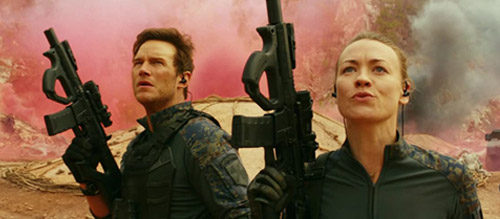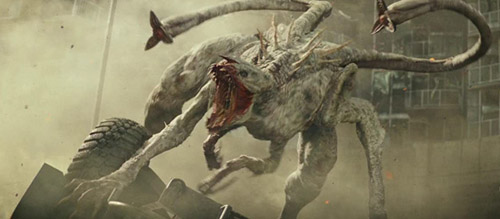The Tomorrow War (2021) Review
The Tomorrow War (2021)
Director: Chris McKay
Screenwriters: Zach Dean
Starring: Chris Pratt, Yvonne Strahovski, J.K. Simmons, Ryan Kiera Armstrong, Betty Gilpin, Sam Richardson
The Tomorrow War is, essentially, about time travel. Trying to use the past to save the future. In this specific case, it’s about cobbling together a bunch of ideas and scenarios and images from incredible movies from decades ago, shoving them into a time-travel blender, and then popping them out in 2021 in what was, surely, hopefully, an earnest attempt to create something fresh from a combination of known quantities, but that inevitably came out looking like the filmic Frankenstein you might expect.
In the future, the human race is under attack from albino tentacled cloverfields. To try and save the remaining 500,000 humans left alive, the humans invent time travel (somehow, it’s never really explained), to recruit people from the past to fight for them, including former-soldier-turned-biology-teacher Dan (Chris Pratt). In the ensuing episode of ‘Doctor Who’, Dan backtracks through Cloverfield, Aliens, The Thing, the original Alien, and other reputable monuments of cinema, in a kind of CGI rendition of better films you’ve already seen, to try to save the future and repair the past he’s told he’ll live when he returns.
Pratt tries his best, and Ryan Kiera Armstrong is probably the best part of the film as his daughter Muri. It’s so rare to find a child actor who can seriously act, and she plays the exact right amount of childhood innocence, adoration of older figures, and independent spirit. And to be fair to the screenwriters, they at least try to keep some character development through the story, giving Dan some personal stakes. Admittedly, Dan is always saying he fights for his daughter, and never once says he does for his wife, played by Betty Gilpin (who, by all accounts, he’s very much in love with, who I’m sure would be very disappointed she didn’t get a look in at least once, even in passing), but it’s something.
The directing, however, is at the very top of a substantial list of sins that this film needs to repent for. It butchers the script (even if it is a clumsy, bitty, patchwork script) before it even manages to get going. Chris McKay (The Lego Batman Movie) seems utterly obsessed with having subtle push-ins during conversations to such a degree that some sequences of shot/reverse-shot have them in every single shot. Could he not find another way to direct it other than to attempt to manufacture some kind of lazy, forced tension?
The signs are there from the very start, the introduction serving no purpose other than to give us a lazy ’28 years earlier’ to generate fake tension by giving a big dumb audience a big burning sky with people falling. And then when there is some meaningful action taking place, it’s just machine gun fire at CGI monstrosities which show that the filmmakers are using less brain cells than the aliens they’re putting on screen, often chopped up to hell under the eyes of the editorial equivalent of a contest knocked out of round 1 of ‘Gordon Ramsay’s Hell’s Kitchen’. There’s no imagination, no love, no interest in making something exciting beyond “lots of machine guns firing; that’ll do it!”
This lack of thought obviously translates to what the filmmakers think of the audience, because the music is loud and obnoxious, sounds like a knock-off Zimmer score and drowns out everything it can whenever it can, like that annoying kid that won’t shut up at a restaurant. It’s possible they thought we wouldn’t know that the film’s biggest moments were meant to be tense if they didn’t get the music to say so whilst turning the amps up to eleven, but who knows?
There’s also some very basic time travel paradox stuff that simply isn’t thought through. When a biological weapon is discovered in the future, and sent back in time where it will eventually wipe the aliens out before the war starts, this then means that there’s never a war to necessitate the invention of said biological weapon. Therefore it can’t be sent back in time (not to mention that the need to invent time travel won’t exist, therefore it won’t get there), and so the aliens won’t be wiped out, and the whole paradox begins again. This issue is never addressed even in passing, not even in a Back to the Future fading-away kind of thing. Have these sci-fi people never watched a single time-travel movie or TV show to at least find a way to mention this in a thirty second scene, and explain how they’re getting around it?
And let’s ignore the fact that it’s not even so much inspired by older sci-fi movies as it is blatantly ripping them off – enough to have them explode a giant spaceship out of the ice, it having been buried there for at least a thousand years. A ship which crashed, the original pilots dead, and were carrying the aliens (nicknamed ‘white spikes’) in big, egg-like embryonic sacs in a ship wrapped with big, vein-like pipes which is only just about passable as a toned-down Giger-inspired vessel. There’s just enough to get away without having copyright strikes launched at the film like nuclear missiles, but I doubt John Carpenter and Ridley Scott would want to waste their time watching the film to know to do so in the first place.
The Tomorrow War is stupid. It thinks it’s clever by throwing time-travel into a military-sci-fi alien extravaganza, but it’s only clever if you’ve never seen a sci-fi movie before. It’s got dialogue as subtle as a sledgehammer at times, direction and editing to make a first year film student’s product look decent, and not even some good acting or the attempt to create some threads to pay off later, can save it from being dull and lifeless. If this is where science-fiction cinema is going, there’ll be more woes tomorrow than wars.
5/24



